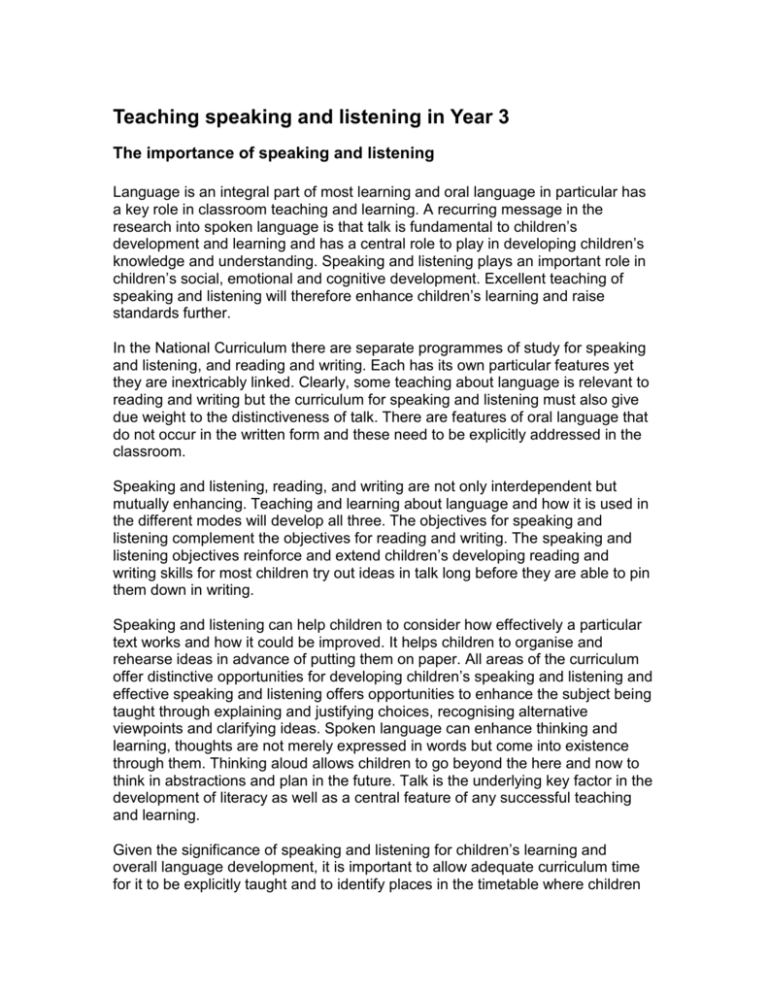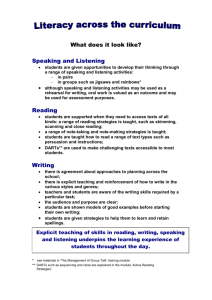Teaching speaking and listening in Year 3
advertisement

Teaching speaking and listening in Year 3 The importance of speaking and listening Language is an integral part of most learning and oral language in particular has a key role in classroom teaching and learning. A recurring message in the research into spoken language is that talk is fundamental to children’s development and learning and has a central role to play in developing children’s knowledge and understanding. Speaking and listening plays an important role in children’s social, emotional and cognitive development. Excellent teaching of speaking and listening will therefore enhance children’s learning and raise standards further. In the National Curriculum there are separate programmes of study for speaking and listening, and reading and writing. Each has its own particular features yet they are inextricably linked. Clearly, some teaching about language is relevant to reading and writing but the curriculum for speaking and listening must also give due weight to the distinctiveness of talk. There are features of oral language that do not occur in the written form and these need to be explicitly addressed in the classroom. Speaking and listening, reading, and writing are not only interdependent but mutually enhancing. Teaching and learning about language and how it is used in the different modes will develop all three. The objectives for speaking and listening complement the objectives for reading and writing. The speaking and listening objectives reinforce and extend children’s developing reading and writing skills for most children try out ideas in talk long before they are able to pin them down in writing. Speaking and listening can help children to consider how effectively a particular text works and how it could be improved. It helps children to organise and rehearse ideas in advance of putting them on paper. All areas of the curriculum offer distinctive opportunities for developing children’s speaking and listening and effective speaking and listening offers opportunities to enhance the subject being taught through explaining and justifying choices, recognising alternative viewpoints and clarifying ideas. Spoken language can enhance thinking and learning, thoughts are not merely expressed in words but come into existence through them. Thinking aloud allows children to go beyond the here and now to think in abstractions and plan in the future. Talk is the underlying key factor in the development of literacy as well as a central feature of any successful teaching and learning. Given the significance of speaking and listening for children’s learning and overall language development, it is important to allow adequate curriculum time for it to be explicitly taught and to identify places in the timetable where children can revisit, apply and extend the speaking and listening skills which they have been explicitly taught. Teaching in Year 3 In Year 3, children will be working on the objectives for their year group. Although fast backtracking may need to take place, this will be so that children can work at age related expectations as soon as possible. Speaking and listening skills will be taught discretely but children will then apply these skills when working in other areas of the curriculum. Children entering Year 3 will have had experience of sequencing and sustaining their talk. In Year 3, these aspects of talk will be developed further. Children will need experience of taking long turns spontaneously and by the end of the year they will be able, not only to sustain a conversation, but to explain and give reasons for their views. These skills can be taught explicitly in any subject of the curriculum with the teacher modelling long turns, for example when making a statement or offering an opinion, the teacher should give reasons for their views in a long turn. The teacher should then remind children to do the same in all curriculum subjects. Children will then be provided with the opportunity to make extended contributions in all areas of the curriculum, for example when they are explaining solutions to problems in maths, science, or justifying their opinions (‘the reason I think this is because…’) By the end of the year, children will be able to give a clear account or explanation which is sustained and complete. This may be reporting findings to a group, or making a more formal presentation to the class using presentational techniques effectively to communicate their message. It is expected that children will be using Standard English in more formal situations so children will need to be taught the difference between formal and informal language and when it is applicable to use each form. Children leave Year 2 able to work collaboratively in groups and listen to each other’s views and opinions before considering alternatives and finally reaching a decision. They will have had experience of supporting (‘I agree…. Yes, we could … .’), or challenging other group members. Some children will need further practice in challenging other group members constructively e.g. ‘I thought that part worked really well, but what about …’. These skills will be extended further in Year 3 and when working in groups (e.g. on a science investigation), children will be taught to organise roles. They need to be allocated specific roles during a group discussion including a chairperson who will open up the discussion and ensure that everyone is involved. The chairperson will also ensure that a plan of action is carried out and move the group towards negotiation or compromise, for example ‘We had better move on if we are going to finish this …. It would it be a good idea if …’ In Year 3 children will move from using language from their own experience to beginning to use the language of possibility to conduct investigations. This will be modelled by adults through asking questions such as ‘I wonder what will happen if …?’ It is expected that children will use the language of possibility when studying feelings in literature, as well as investigating problems in other curriculum areas. This language will need to be taught (probably, maybe, perhaps, presumably…, and tentative phrases such as this suggests, I suppose, what if, what about ….) This language will be closer to first draft talk and characterised by exploring ideas collaboratively. After teaching and modelling this language, children will need the opportunity to practise this for themselves during group work in other curriculum subjects.





